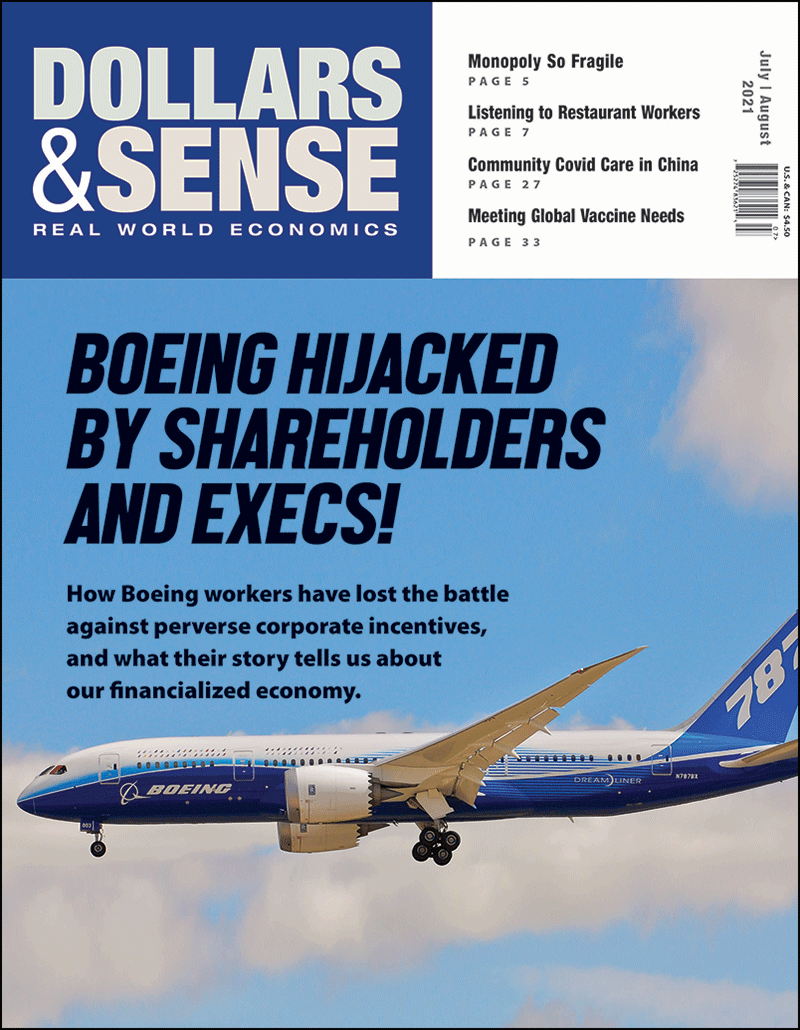Fighting Climate Change in Portlandia
Not only is failure not an option, those fighting to avert cataclysmic climate change have achieved important successes worthy of celebrating.

Our July/August issue is at the printers and we've sent pdfs out to e-subscribers! (Not a subscriber? You can subscribe here.)
We just posted Marie Duggan's cover story, "Boeing Highjacked by Shareholders and Execs!" Here is the p. 2 editors' note:
After you read Marie Duggan’s cover story on the hijacking of aerospace giant Boeing by “corporate thugs” (as 30-year Boeing employee Kevin Sanders put it), you may never want to fly on a Boeing jet again—at least any designed and built in the past 20 years. Duggan documents how, over the past two decades, the people managing the cash at Boeing have chosen to funnel it toward shareholders and executives, with bloated executive compensation and stock options that inflate share prices, instead of investing in production and a skilled workforce. The result? Products—in particular, the 737 Max and the 787 Dreamliner—that explode and disintegrate in mid-air. (Remember those names when you book your flights!)
Central to Duggan’s piece is how workers at Boeing raised alarm bells about threats to product quality and safety—and were ignored. With no domestic competitors in aerospace, Boeing’s monopoly position means it doesn’t need to compete based on product quality or innovation. Boeing workers—machinists, mechanics, and quality inspectors—were the custodians of Boeing’s prior tradition of attention to quality and safety, but Boeing’s management has shifted the focus to shareholder value. And they used the company’s monopoly power to get government contracts and to embed revolving-door regulators.
The story of Boeing’s decline is significant for what it shows about the U.S. economy more generally. Duggan’s 2018–2019 D&S series on deindustrialization showed that the United States lost one-third of its manufacturing jobs from 2001 to 2009. Her latest article documents the shocking decline in labor productivity over the same period (as shown vividly in Figure 1 of the article). As Duggan reminds us, across the publicly traded firms in the U.S. economy, financialization and monopoly provide incentives for management to maximize shareholders’ and executives’ profits, at the expense of innovation, productivity, and (in some cases) safety.
Other articles in this issue address the themes touched on in Duggan’s article—monopoly, stock buybacks, and (lack of) innovation. Cory Doctorow’s Comment uses the debacle of that container ship getting stuck in the Suez Canal earlier this year as an object lesson on one of the lesser-known dangers of monopoly: its fragility. Neoliberalism tolerates—even encourages—industry consolidation in the name of efficiency, but putting management decisions into fewer and fewer hands leads to increased risks, and “brittle interdependencies” in which a stuck ship, or a supply-chain gap, can bring the whole system down.
John Miller’s column on corporate taxes highlights how Fortune 500 companies have been following the same pattern Duggan documents at Boeing—shifting more and more of their free cash away from capital expenditures and toward shareholders. As Miller reports, Trump’s 2017 tax cuts led U.S. multinationals to repatriate three times more profits, but “those repatriated profits went nearly exclusively to stock buybacks and dividends rather than to investment.”
Arthur MacEwan’s column addresses whether the rich countries’ protection of pharmaceutical companies’ Covid-19 vaccine patents—obviously morally monstrous—is also economically stupid. This, too, is a story of the dangers of monopoly: that of the pharmaceutical companies whose patents—and profits—the rich countries’ governments protect (ironically, via “free trade” agreements). Industry lobbyists and revolving-door regulators influence the government to protect patents even when keeping vaccines from the developing world, in addition to being murderous, will have severe economic blow-back in the rich countries. The justification for patent protection is supposed to be innovation, but as MacEwan points out, reality says otherwise. All the Covid-19 vaccines were heavily government funded, which reduced risk for pharmaceutical companies, yet they insist on reaping all the rewards. Meanwhile, patent protection actually inhibits innovation—by preventing people and firms from building on old ideas.
Also in this issue: how government support is allowing restaurant workers to rethink their jobs—and the brutal conditions, poor pay, and disrespect that they don’t mind leaving behind; a critique of “ethical consumerism”; China’s use of neighborhood groups for Covid-19 care work; a review of the theatrical film Espíritu from the Public Theater; and more!